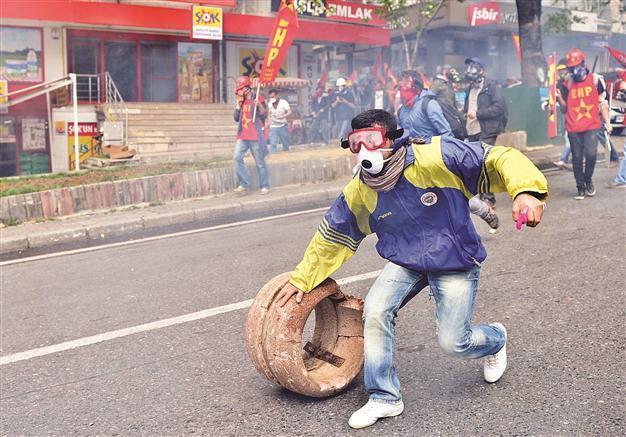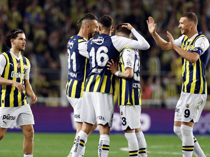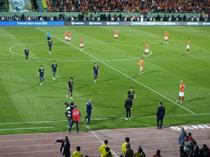The battle for Taksim, a battle for Turkey’s soul
James M. DORSEY

A man wearing a Fenerbahçe jersey rolls an object during the May Day clashes in Istanbul. Football fans are more visible in street protests after Gezi. AA Photo
Militant supporters of Istanbul’s top three football clubs added muscle to thousands of trade unionists, leftists and government opponents in May Day clashes with Turkish police, in what has become a battle for control of the city’s iconic Taksim Square.With 40,000 men on duty, 20,000 of whom were stationed on and around Taksim, police fired tear gas and rubber bullets to prevent protesters from reaching the square. Clashes erupted in various parts of the city, including Beşiktaş, home to çArşı, the widely popular supporters’ group of Beşiktaş. Turkish media reports said 51 people were injured and 138 arrested.
The significance of Taksim to both the government and its critics was highlighted by the fact that the government banned May Day celebrations on the square on alleged national security grounds, but assigned an area on the outskirts of the city where the unions and others would be allowed to mark Labor Day.
Taksim, Istanbul’s historic venue for May Day demonstrations and other gatherings, has been contested territory since the eruption last June of the largest mass anti-government protests against Prime Minister Recep Tayyip Erdoğan since he was first elected in 2002. Militant football fans played a key role in those protests. The government has since banned all demonstrations in the square.
Criticism of Mr. Erdoğan focuses on his haughty style of government, his recent refusal to constructively engage with his opponents, his refusal to allow due process in what is the most serious corruption scandal since he came to office, and authoritarian moves that threaten to curtail Turkish democracy. It does not focus on Mr. Erdoğan’s Islamist credentials.
That is a far cry from the “us and them” discussion of almost 20 years ago, when the economic elite moved vast sums of money out of Turkey out of fear that then Prime Minister Necmettin Erbakan would turn it into an Islamic republic. The elites at the time cheered Mr. Erbakan’s removal in a silent military coup and the banning of his Refah Party, from which Mr. Erdoğan’s Justice and Development Party (AKP) emerged.
Equal interest
The battle for Taksim reflects that change. It is a battle for the soul of a Turkey in which all Turks have an equal interest. It is a battle that is as much about sheer power as it is about the nature of Turkish democracy. It is a battle that is in part being fought on the football pitch, evidenced by the participation of football fans, as well as by the banners they carried and the slogans they chanted during the May 1 demonstrations.
The stakes are high for fans and go to the heart of the struggle for Turkey’s soul. In Istanbul and other Turkish cities, fans denounced the government’s e-ticket system that would give it access to their personal details against the background of an effort in the past year to portray protest as a precursor for terrorism and an attempt to criminalize militant football groups. Twenty members of Carşı were last year charged with belonging to an illegal organization.
Several Turkish clubs have said they would refuse to implement the e-ticket system.
















